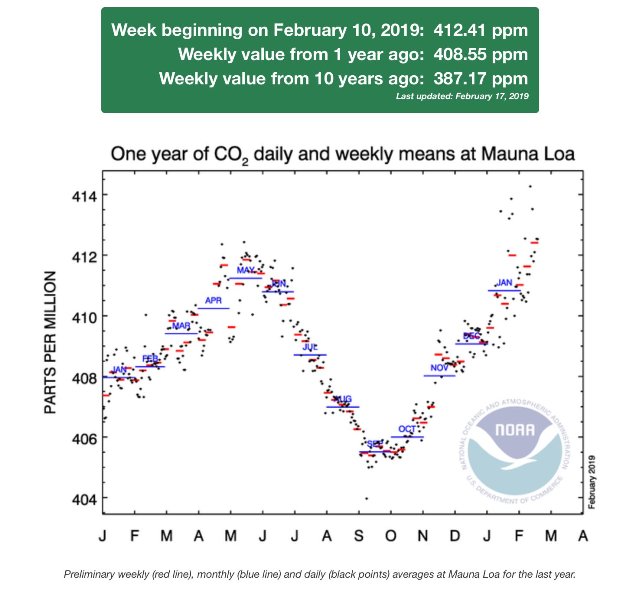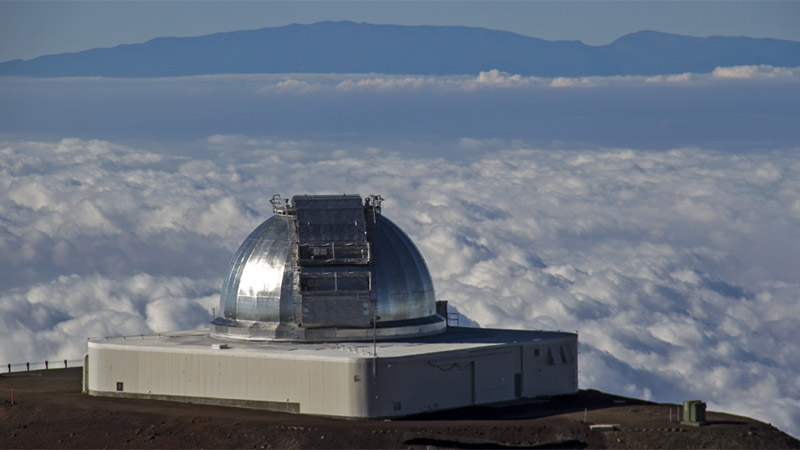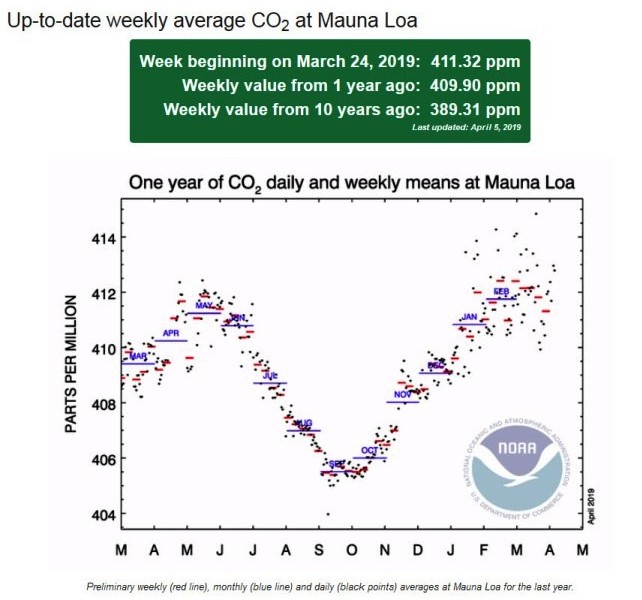File:Mauna loa CO2 record scripps.png: Difference between revisions
Siterunner (talk | contribs) No edit summary |
Siterunner (talk | contribs) No edit summary |
||
| (3 intermediate revisions by the same user not shown) | |||
| Line 9: | Line 9: | ||
''Observatory staff has established limited solar power in four observatory buildings and restored approximately 33 percent of the measurements onsite, including the Global Monitoring Laboratory and Scripps critical CO2 records and other atmospheric measurements.'' | ''Observatory staff has established limited solar power in four observatory buildings and restored approximately 33 percent of the measurements onsite, including the Global Monitoring Laboratory and Scripps critical CO2 records and other atmospheric measurements.'' | ||
<big>'''2024'''</big> | |||
CO2 measurements ... | |||
July 2024: 425.55 ppm | |||
July 2023: 421.83 ppm | |||
| Line 17: | Line 29: | ||
• https://www.esrl.noaa.gov/gmd/ccgg/trends/ | • https://www.esrl.noaa.gov/gmd/ccgg/trends/ | ||
• https://scripps.ucsd.edu/programs/keelingcurve/ | • https://scripps.ucsd.edu/programs/keelingcurve/ | ||
| Line 28: | Line 38: | ||
'''2019''' | '''2019''' | ||
413.45 ppm on January 12, 2019 (NOAA-ESRL) | 413.45 ppm on January 12, 2019 (NOAA-ESRL) | ||
| Line 78: | Line 88: | ||
:[https://www.theguardian.com/environment/2019/apr/05/why-the-guardian-is-putting-global-co2-levels-in-the-weather-forecast '''CO2 Levels Now in the Weather Reports'''] | :[https://www.theguardian.com/environment/2019/apr/05/why-the-guardian-is-putting-global-co2-levels-in-the-weather-forecast '''CO2 Levels Now in the Weather Reports'''] | ||
:* '''https://www.esrl.noaa.gov/gmd/ccgg/trends/index.html''' | :* '''https://www.esrl.noaa.gov/gmd/ccgg/trends/index.html''' | ||
Latest revision as of 23:05, 16 August 2024
Temporary Volcanic Interruption
Measurements at the Mauna Loa Observatory stopped after the 2022 eruption of the Mauna Loa volcano, when lava flow crossed the access road and took out power lines to the facility. The observatory remains inaccessible by vehicle and without power from the local utility company.
Observatory staff has established limited solar power in four observatory buildings and restored approximately 33 percent of the measurements onsite, including the Global Monitoring Laboratory and Scripps critical CO2 records and other atmospheric measurements.
2024
CO2 measurements ...
July 2024: 425.55 ppm
July 2023: 421.83 ppm
2023
CO2 Measurements @Mauna Loa, Hawaii
• https://www.esrl.noaa.gov/gmd/ccgg/trends/
• https://scripps.ucsd.edu/programs/keelingcurve/
Highest Daily CO2 Records (by year) | Mauna Loa Observatory
Measurements are made by two independent CO2 monitoring programs (NOAA and Scripps) at the Mauna Loa Observatory in Hawaii about 3400 metres above sea level.
2019
413.45 ppm on January 12, 2019 (NOAA-ESRL)
411.14 ppm on January 7, 2019 (Scripps)
411.08 ppm on January 6, 2019 (Scripps)
2018
412.60 ppm on May 14, 2018 (Scripps)
412.45 ppm on May 14, 2018 (NOAA-ESRL)
412.37 ppm on April 23, 2018 (NOAA-ESRL)
2017
412.63 ppm on April 26, 2017 (NOAA-ESRL)
411.27 ppm on May 15, 2017 (NOAA-ESRL)
2016
409.44 ppm on April 9, 2016 (Scripps)
409.39 ppm on April 8, 2016 (Scripps)
2015
404.84 ppm on April 13, 2015 (Scripps)
○
- Weather +
- The Keeling Curve has been called one of the most important scientific works of the 20th century
File history
Click on a date/time to view the file as it appeared at that time.
| Date/Time | Thumbnail | Dimensions | User | Comment | |
|---|---|---|---|---|---|
| current | 16:58, 18 January 2019 |  | 800 × 480 (120 KB) | Siterunner (talk | contribs) |
You cannot overwrite this file.


